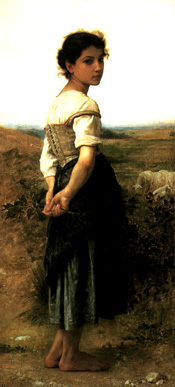First Performance: 17 November 1786, Burgtheater,
Vienna.
Principal Characters:
| Queen Isabella |
Soprano |
| Don Giovanni (the Prince), her son |
Tenor |
| Corrado, a great squire |
Tenor |
| Lilla, a shepherdess |
Soprano |
| Lubino, a shepherd and beloved of Lilla |
Baritone |
| Tita, brother of Lilla |
Bass |
| Ghita, beloved of Tita |
Soprano |
| Lisargo, chief magistrate |
Bass |
Time and Place: 15th Century Spain.
Synopsis:
Act One
As Queen Isabella returns from a hunt, she is met by her son, Don
Giovanni. Lilla suddenly bursts into the room, appealing for help from the
Queen. She and Lubino are in love. But her brother, Tita, has promised her to
Lisargo, the local chief magistrate. The Queen refers the matter to Corrado,
much to the chagrin of Don Giovanni who is quite taken with the maid.
Don Giovanni attempts to woo Lilla, but she resists his charms. She
confirms her love for Lubino.
As they exit, Tita enters arguing with Ghita. Lisargo follows and
interrupts them. Lubino then appears looking for Lilla, whereupon Lisargo
departs. Not finding her, Lubino swears vengeance if anything should have
happened to Lilla. Lisargo, however, returns with his men to arrest Lubino.
Alone, Ghita admonishes Tita to allow the marriage between Lilla and
Lubino.
Ghita goes to the Queen's residence where she finds Lilla. They argue but
are interrupted by the Queen. She sends Ghita to bring Tita and Lubino.
Meanwhile, Corrado tells Lilla of Don Giovanni's love for her. The Prince
arrives to renew his courting. Lilla hides when Lubino interrupts them. He
asks the Prince for help. The Queen reappears and Lubino repeats his request.
Tita and Ghita arrive. The Queen orders Lubino and Lilla to be released.
Lilla emerges from her hiding place. To a suspicious Lubino, Corrado attests
to the Lilla's loyalty. The Queen orders that there shall be a double
marriage of Tita to Ghita and Lubino to Lilla. All are forgiven.
Act Two
While Lubino and Tita are purchasing presents for their betrothed, Ghita
tries to convince Lilla to yield to the Prince's courtship. She enumerates
the many advantages, including the acquisition of many gifts. Corrado
arrives. He too urges Lilla to accept the Prince's advances. Lilla resists
these attempts.
The Queen arrives with the Prince. He asks for permission to attend the
wedding ceremonies. Lubino and Tita arrives with their gifts, which they
present to the Queen. The Queen accepts them and gives them to Lilla and
Ghita.
Don Giovanni and Corrado discuss Lilla's refusal to accept the Prince.
Lilla and Ghita are looking for Lubino and Tita, who are late. In the
darkness, they see two figures whom they believe are Lubino and Tita. They
soon discover that they are the Prince and Corrado. Lubino and Tita arrive at
that moment, their suspicions aroused.
Later that evening, they vent their suspicions, which are fiercely
denounced as baseless. As all doubts are dispelled, the Prince arrives to
serenade Lilla. A confrontation ensues. Lisargo comes forward so as not to
compromise the Prince. In hiding, the Prince fires his pistol to prevent more
of his followers from coming. Lubino and Tita attack Lisargo with the help of
Lilla and Ghita. The Prince comes forth to bring peace. Tita angrily walks
away, followed by Ghita.
After finding presents given by the Prince, Tita remains suspicious. Tita
tries to turn Lubino against Lilla. Lubino, however, remains steadfast.
Nonetheless, Tita convinces Lubino to go to the Queen to seek justice. Lubino
asks who is trying to seduce his betrothed. The Prince asks Corrado not to
reveal the truth. Corrado then steps forward and accepts the blame. The Queen
dismisses him and orders him to be sent into exile.
Lilla and Ghita enter and thank the Queen for upholding their honor. The
Queen returns to the hunt with all in celebration.
Click here for
the complete libretto.
Click
here for a biographical essay on Martín y Soler.

Click here to download VideoLAN, a free cross-platform media player.

